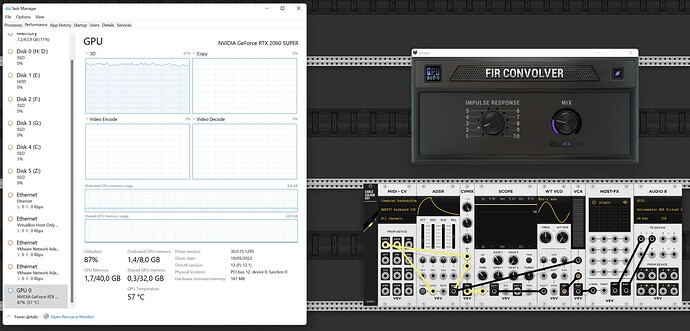I’m on Windows
ok, if you are on a laptop be sure to “tell” Windows to use the proper video card (not the integrated one if you’re on a laptop) for …\Rack.exe
p.s. to monitor resources on Windows I use CPUID HWMonitor, or GPU Profiler if I have to look better on GPU related stuff
I’m running a low budget Nvidia-Card on a 4k-screen. The best optimization I could do was to hack the Rack, see : Trying to optimize NanoVG - #12 by Ahornberg
I’m confused. What was this discussion meant to be? Of course this is the “Lounge”, which I probably should have noticed, but did not.
Recalibrating my thoughts to this as a Lounge topic, I think this company and their technology is worth keeping an eye on. Their GPU powered VST plugin line begins open beta this month. In my mind, it is still worth considering the viability of such VST plugins external to Rack.
If they are able to do what they say they can for VST plugins, then it is just engineering do the same thing in any context, as long as no physical or computational laws are broken.
Just my opinion. Everything innovative I have ever done in my 50+ year professional life was said to be impossible by someone(s), often times by those who were the domain experts.
exactly
![]()
I will bet you money that no one ever gets GPU audio to work with single sample blocks on any GPU architecture that looks like what we have today.
There have been convolution reverbs that run on GPU for maybe 20 years now?
Yep. The company in this topic claims to be doing GPU DSP processing via massively parallel technology. I for one would like to see them succeed and if they do or do not, there is something to be learned, if nothing else. I wouldn’t bet against them, but I wouldn’t bet on them either. I will watch the splash though.
last I heard (from ppl much smarter than me) is that the “impossible” comes from the time it takes to samples into a GPU, plus the time it takes to get them out, is a) easily quantifiable, and b) way, way too long to achieve low latency.
So it’s not like “if man were meant to fly he would have wings”, its more a + b > c.
btw, 20 years ago the CPU required to do a convolution reverbs was significant, so it was an interesting proof of concept.
That’s why it would be interesting to see whether this company lives up to it’s claim to achieve “predictable low latency”, and what is meant by “low”. It should become clear very soon whether they can achieve this promise since they are entering open beta this month.
pretty cool. one of these years / decades I may have to eat my words ![]()
Hehehe ![]()
I don’t like push for another closed source api on top of layers of closed source gpu drivers, nothing magical in GPU hardware [1] and everyone already somewhat can do this [2] [3]
To me at this point it looks like another tech startup using VC money targeting niche market, with heavy marketing and hype around GPU, instead of actual technological innovation that they selling.
[1] public/GPGPU - what it is and why you should care -- Alexander Titov -- CoreHard 2019.pdf at master · alexander-titov/public · GitHub [2] https://cindybui.me/images/Bui_Thesis.mp4 [3] GitHub - Cindytb/Acoustic-Raytracing: OptiX 7 Powered Realtime Acoustic Raytracing
they say win’s task manager is not accurate at this time for this job
Given that this looks like a major disruptive moment in audio technology, it would be good if its development was combined with a new open plugin format to replace AU/VST/AAX etc.
I kind of doubt some little startup if going to finally crack GPU audio, and launch a successful open plugin standard simultaneously ![]()
I note that they have a new DAW on the roadmap. Why would you release a new DAW if all you wanted to do was run adapted VSTs in it? I suspect that they will be running a native plugin format within the DAW that is fully optimised for GPUs (as well as supporting traditional formats).
That said, they are creating a new proprietary tech here, something that they expect to license just like Steinberg and Apple do. I wonder if they can control this though, somebody else will replicate it and launch an alternative fairly quickly I should think; I just hope that plugin companies take this opportunity to finally grasp the mettle of a fully open plugin format, something that many of them have been mooting for years.


